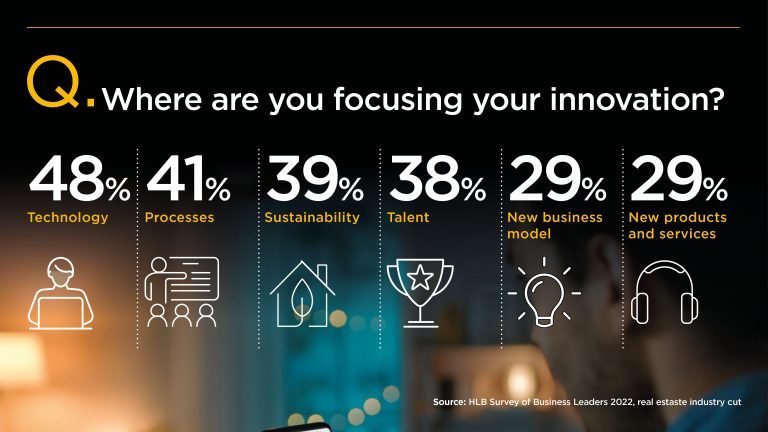
Innovation is critical to future-proofing the real estate and construction sector, Workplace flexibility.
31 March 2022

A complex risk landscape
As fear around the pandemic subsides, confidence in the global economy has more than doubled, reaching 48% this year compared to only 22% last year. However, with the war in Ukraine ongoing, these figures may change as the year progresses. Real estate and construction business leaders remain cautious, aware that a complex risk landscape is still in play with several concerns that require close attention.
Tying in with general economic unease, the looming spectre of inflation is noted as the second most concerning factor in the real estate and construction industry. Almost three-quarters of business leaders worry about how inflation could affect wages, material costs, and delivery times. The thousands of unfinished buildings abandoned after the 2008 financial crash continue to provide a stark reminder of how economic and inflationary pressures can derail construction projects.
But the economy is not the only notable macro factor that concerns real estate and construction professionals. Regulatory changes like the UK's Building Safety Bill are becoming increasingly stringent around the world and bring with them a host of additional costs and obligations.
Finishing off the top five concerns that keep industry leaders up at night are:
regulatory change at 74%
tax risk with 68%
and social instability at 56%
Tying in with social instability, fears regarding geopolitical uncertainty (50%) and international trade flow disruption (45%) remain high and are unlikely to abate while the war in Ukraine wages on. Navigating this complex mix of risks in the macro environment may prove the greatest challenge for real estate leaders in 2022.
Fears and risks aside, 89% of real estate and construction leaders seem to agree on one thing: the challenges presented by two years of market disruption have motivated them to innovate even further. Having survived this far has provided them with fresh confidence and determination to overcome any new challenges that come their way. Business leaders who are prepared to pivot and reinvent business models when new market disruptions occur will be well placed to thrive over the next few years.
Success through innovation
The adoption of innovative technologies and modern business practices will be the key factors that define success for real estate and construction businesses going forward. However, keeping track of these changes and knowing how to integrate them into your existing business model can be a challenge
About our research
Findings in this article are based on 66 survey responses from real estate and construction business leaders collected in quarter 4 of 2021, as part of HLB’s Survey of Business Leaders 2022. The majority of businesses surveyed are privately or family owned. For the full research report see HLB’s Survey of Business Leaders 2022: Powering your innovation engine.






